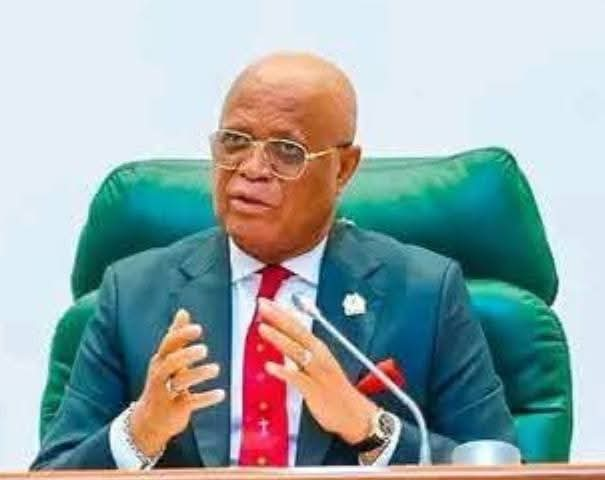
Sunday August 24, 2025
By The NewsDESK |
By Dennis UDOMA
“Justice is the only foundation for peace. Without it, conflict will not end”.
That was the reaction of Chief Umani Ibono Ekaluo during an emergency meeting of Akwaha Esop Ndito Ibeno World-wide at Ukpenekang recently, when receiving the news of Governor Umo Eno stepping in to chair Ibeno-Eket-Esit Eket conflict resolution committee, to douse the flames of one of the state’s longest-running communal disputes, the decades-old ownership battle among Ibeno, Eket, and Esit Eket Local Government Areas over the oil-rich Stubb Creek.
Governor Umo Eno, in a bold move recently, announced plans for the constitution of a high-powered Peace Committee to examine historical claims, reconcile aggrieved communities, and chart a path to lasting stability.
For the first time in years, hopes are rising that the cycle of bloodletting, destruction, and mistrust that has haunted the coastal axis of the state may finally be broken.
A Dispute Deeply Rooted in History:
The Stubb Creek enclave, situated along the Atlantic coastline and housing multi-billion-naira oil and gas infrastructure, lies at the center of the bitter conflict. Though small in size, its economic value is immense.
Successive governments have relied on oil wells, terminals, and pipelines within the disputed stretch to feed both state and federal revenues.
But for over four decades, ownership claims by Ibeno, Eket, and Esit Eket occasionally joined by Mbo have turned the zone into a battlefield.
Historical treaties, colonial-era administrative boundaries, and controversial royalty allocations have complicated the matter further, leaving no party willing to concede ground.
Over time, what started as a boundary disagreement has morphed into violent clashes. Communities have been invaded, families displaced, and infrastructure destroyed in recurring waves of hostilities.
Governor Eno’s Intervention:
Speaking during a town hall meeting with stakeholders of Eket Federal Constituency on August 2, Governor Umo Eno declared that his administration could no longer fold its arms while communities bled.
He announced the formation of a Peace Committee, to be chaired by him personally, with two nominees each from Ibeno, Eket, and Esit Eket, and a possibility of including Mbo LGA given its boundary ties.
“We are determined to broker lasting peace. The committee will work transparently, reviewing historical claims, treaties, and royalty arrangements. Akwa Ibom cannot make progress while its coastal communities are in perpetual crisis,” the governor assured.
His words sparked cautious optimism. For many residents, this was the strongest signal yet that the state government is ready to go beyond platitudes and tackle the root causes.
Ibeno Welcomes Move, Recalls Bloody Attacks:
In Upenekang, headquarters of Ibeno LGA, community leaders under the umbrella of Akwaha Esop Ndito Ibeno Worldwide described the initiative as “long overdue.”
Spokesperson, Chief Umani Ibono Ekaluo, while addressing journalists after an emergency meeting, recalled the series of bloody attacks that have left Ibeno devastated in recent years.
He listed some notable incidences of attacks by Ibeno neighbours to include; the February 28, 2024 armed men invasion of Iwuoachang, killing seven persons and November 8, 2024 Inua Eyet Ikot came under siege.
Others are; the December 24, 2024 (Christmas Eve) invasion of Ndito Eka Iba, leaving homes razed and over 9 missing children.
In 2025 , Ibeno also recorded two separate assaults on Inua Eyet Ikot, the latest just a day before the Governor’s town hall meeting at Eket.
“These unprovoked attacks have left families bereaved, homes in ashes, and properties worth billions destroyed. Relief has been absent, and government projects are nearly non-existent compared to our neighbours,” Ekaluo lamented.
He accused the aggressors of seeking to destabilize Ibeno and cripple its economic relevance, despite the community’s central role in hosting oil majors like ExxonMobil now Seplat Energy and other critical national assets.
Fear of Escalation, Plea for Swift Action:
Imagining the magnitude of waste and destruction should they retaliate the aggressors, Ibeno leaders stressed that their people have refrained from retaliation, not out of weakness, but out of fear that reprisals could trigger a wider conflagration.
“We have resisted the temptation to retaliate many times because we do not want to escalate the conflict and frighten away investors in the oil and gas sector,” Ekaluo explained.

Still, they urged Governor Eno to inaugurate the committee without delay, warning that procrastination could invite more bloodshed.
“This intervention must be timely, impartial, and thorough. Justice must prevail, and peace must be restored to all affected communities,” the spokesman insisted.
Past Efforts and Failures:
The Ibeno–Eket–Esit Eket dispute is not new to successive governments. Several panels, commissions, and mediatory attempts in the past two decades have ended in stalemates.
Under the Attah administration (1999–2007), a boundary demarcation exercise was initiated but stalled midway following violent protests.
During the Akpabio years (2007–2015), efforts shifted to dialogue and revenue-sharing talks. Yet, distrust among communities prevented any agreement.
The Udom Emmanuel administration (2015–2023) attempted a compensation package through oil companies, but critics said it only deepened resentment.
Aside from the alleged attempted compensation, Governor Udom era even added more salt to the injury, by attempting to redraw Akwa Ibom State map in order to divert some communities in Ibeno and Eastern Obolo LGAs into Onna, Eket and Esit Eket LGAs to benefit from the Petroleum Industry Act (PIA), Host Community Development Trust Funds (HCDTF).
These failures have entrenched cynicism among locals. Many believe that only a governor willing to take ownership of the process, as Governor Eno has now pledged can deliver results.
The Human Cost of a Forgotten War:
Beyond the statistics of lives lost and houses destroyed lies a deeper tragedy. Families displaced by past clashes still live in makeshift shelters. Widows recount harrowing nights of escape through mangroves, children lost years of schooling, and entire villages remain half-deserted.
Economic activities have equally suffered. Fishing, once the mainstay of Ibeno, has been crippled by insecurity along creeks. Businesses have closed. Investors remain wary.
Experts argue that until justice, compensation, and equitable development reach the grassroots, no peace deal will endure.
Expectations from the Peace Committee:
While the expectation is running high since Governor Eno broke the news on constitution of a peace committee to be headed by him, stakeholders say the proposed committee must; establish clear boundary lines through transparent consultations and professional mapping; address historical grievances by reviewing archival treaties, colonial maps, and past royalty allocations.
Others are; recommend reparations for victims of attacks including compensation for destroyed properties; ensure fair development by spreading state projects equitably to Ibeno; guarantee security by deploying permanent peace-keeping outposts in the area for the protection of national assets and oil/gas infrastructure.
Anything short of this, many fear, may result in yet another failed exercise.
Hopes of a New Dawn:
Governor Umo Eno’s peace drive comes at a time when Akwa Ibom is pushing to diversify its economy and attract more foreign direct investment.
Analysts warn that, no investor will commit to a state where vital oil terminals are perennially threatened by communal wars.
By personally chairing the peace committee, the governor is seen to be placing his political capital on the line. If successful, the initiative could end decades of hostilities, heal deep wounds, and set a model for conflict resolution in the Niger Delta.
For now, communities wait with bated breath. Will the committee break the curse of failed interventions? Or will the crisis once again slip into the shadows, only to resurface with deadlier consequences?
As Chief Ekaluo aptly put it, “We are hopeful, but we are also watchful. Justice is the only foundation for peace. Without it, this conflict will not end.”

Related posts
Categories
- Advertisements (1)
- Agriculture (45)
- Breaking News (26)
- Business (598)
- Crime (991)
- Education (320)
- Entertainment (128)
- Features (13)
- For The Records (43)
- Foreign News (1,190)
- Health (219)
- Home News (332)
- Interview (9)
- Judiciary (352)
- Lifestyle (140)
- Local News (111)
- National News (1,448)
- Opinion (26)
- Politics (1,014)
- Religion (157)
- Science and Technology (125)
- Security (684)
- Sports (881)
- States' News (822)
- Transportation (330)
- Uncategorized (10)

